 |
Kovács Ferenc
Hungary
|
|
|
|
|
|
|
| |
Music for Films
(Filmzenék)
|
world music |
|
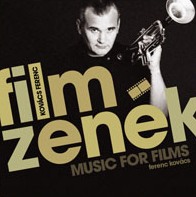
| 1. | Remény | | 2. | Tévedés | | 3. | Verkli | | 4. | Padon | | 5. | Munka-munka | | 6. | Fogadás | | 7. | Börtön | | 8. | Doboz | | 9. | Főcímzene / Remény | | 10. | Hazátlan ember | | 11. | Halál | | 12. | Hommage à giulietta | | 13. | Tangó | | 14. | Éjjeli pillangók / Lacika | | 15. | Mambongó | | 16. | Ármány és szerelem | | 17. | Álomkeringő | | 18. | Híd | | 19. | Mambó Nino (Hommage à Nino Rota) | | 20. | Üzenet | | 21. | Mese | | 22. | Borvidékeink | | 23. | Remény / lassú téma |
| bonus track |
| 1. | Körhinta | | 2. | Cigányos (video) |
|
|
Comments
(0 messages) |
|
GR 101 |
CD |
2012 |
0.00
€ |
 |
|
|
|
|
|
|
|
|
|
|
| |
|
My Roots
|
world music ,
jazz |
|
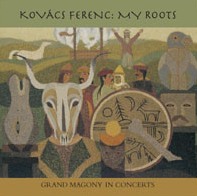 Ferenc Kovács (Öcsi) has come out with a new album compiled from the best concert recordings of recent years. The CD begins with the 2004 performance of Magony Strings, then it dissolves almost unobserved into the Magony concert of 2007 in Debrecen, where the strings are completed with wood instruments and drums. In the last part of the album, the Great Magony Orchestra can be heard, where the best fellow-musicians of Ferenc Kovács are lined up: Mihály Dresch, Kálmán Balogh, Zoltán Kovács, Szilárd Bánai and Ferenc Schreck all reinforce Magony. A comprehensive and capturing disc which summarizes the solo projects of Ferenc Kovács.
Ferenc Kovács (Öcsi) has come out with a new album compiled from the best concert recordings of recent years. The CD begins with the 2004 performance of Magony Strings, then it dissolves almost unobserved into the Magony concert of 2007 in Debrecen, where the strings are completed with wood instruments and drums. In the last part of the album, the Great Magony Orchestra can be heard, where the best fellow-musicians of Ferenc Kovács are lined up: Mihály Dresch, Kálmán Balogh, Zoltán Kovács, Szilárd Bánai and Ferenc Schreck all reinforce Magony. A comprehensive and capturing disc which summarizes the solo projects of Ferenc Kovács.
Ferenc Kovács – violin, trumpet, vocal (1-9)
Sándor Budai - violin (1-6)
Kálmán Oláh – violin (1-4)
Beáta Salamon – violin (4)
Csaba Novák – double bass (1-6)
Antal Tabányi – violin (5-6)
Péter Bede - sax, flute (5-6)
Szilárd Banai - drums (5 -9)
Mihály Dresch – sax (6-9)
Ferenc Schreck – posan (6-9)
Zoltán Kovács – piano (6-9)
Kálmán Balogh – cimbalom (6-9)
Mátyás Szandai – double bass (6-9)
Jeremy Barnes – percussion (7)
| 1. | Bevezetés | | 2. | Sziklarajzok | | 3. | Legényes | | 4. | Groteszk | | 5. | Cigányos | | 6. | Somogyi áldásos | | 7. | Medvetánc | | 8. | Bújdosik az árva madár | | 9. | Ballada |
|
|
Comments
(0 messages) |
|
GR 083 |
CD |
2009 |
0.00
€ |
 |
|
|
|
|
|
|
|
|
|
|
| |
|
Beli Buba
|
world music ,
jazz |
|
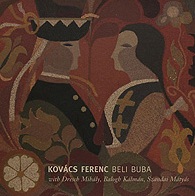 Again, the audience will have thirteen pearls of Öcsi Kovács’ music considered as a Hungaricum. The internationally recognized trumpet player and violinist compiled a striking album with Mihály Dresch (saxophone, flute), Kálmán Balogh (cymbal) and Mátyás Szandai (contrabass). The most prominent national representatives of the national ethno-jazz genre have facilitated the synthesis of the universal and Hungarian musical culture. A 24-minute concert video has been inserted in the CD in addition to the 13 audio tracks, which were recorded at the band’s concert held at the MU Theater in Budapest.
Again, the audience will have thirteen pearls of Öcsi Kovács’ music considered as a Hungaricum. The internationally recognized trumpet player and violinist compiled a striking album with Mihály Dresch (saxophone, flute), Kálmán Balogh (cymbal) and Mátyás Szandai (contrabass). The most prominent national representatives of the national ethno-jazz genre have facilitated the synthesis of the universal and Hungarian musical culture. A 24-minute concert video has been inserted in the CD in addition to the 13 audio tracks, which were recorded at the band’s concert held at the MU Theater in Budapest.
The sound record was compiled for the performance titled ’Tisztújítás’ (’The election of officials’) at the Attila József Theater in the first quarter of 2006. The music, however, constitutes a new repertoire of ’The Six’ formation. Mainly, the one titled ’Pasa’ (’Pasha’) that has a longer playing time appears at this point in its pieces (see ’Ostrom’ (’The Siege’), ’Tüntetés’ (’The Rally’), ’Pasa’ (’Pasha I., II., III., IV.’). The four musicians were few in number, it must have been played again with the piano and the wind section, so that the meaning of the original can be manifested. The music having had love and change themes already demonstrated the character of the band, which is de facto a fresh synthesis of the music played by the Kálmán Balogh Gipsy Cimbalom Band and the Dresch Quartet. The fact that every track was compiled by single recording verifies this freshness, which found the musicians in their good moods. The archive video record was compiled at the MU Theater on September 10 on the occasion of the Dresch Celebration, in which the adaptation of the song titled ’Bujdosik az árva madár’ (’The lonely bird hides’) can be listened to on the album titled ’Hatok’.
Kovács Ferenc – trumpet, flugelhorn, violin, keyboards, percussion
Dresch Mihály – saxophone, flute
Balogh Kálmán – dulcimer
Szandai Mátyás – double bass, percussion
| 1. | Pasha I. | | 2. | Love Song I. | | 3. | Transformations I. | | 4. | Flourish | | 5. | Siege | | 6. | Pub Music | | 7. | Pasha II. | | 8. | Love Song II. | | 9. | Transformations II. | | 10. | Demonstration | | 11. | Pasha III. | | 12. | Love Song III. | | 13. | Pasha IV. | | 14. | Love Song (video) | | 15. | The Lonely Bird Is Wondering (video) |
|
|
Comments
(0 messages) |
|
GR 068 |
CD |
2007 |
0.00
€ |
 |
|
|
|
|
|
|
|
|
|
|
| |
|
Hat6ok
|
world music ,
jazz |
|
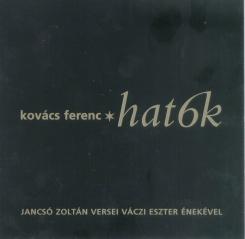 Zoltán Jancsó’s poems with singer Eszter Váczi. Feri Kovács has compiled a superb album again. He composed music for Zoltán Jancsó’s poems and also invited Eszter Váci to sing along, who has a fabulous voice. A few instrumental jazz compositions were also inserted in the row of poems, to which he composed melodies that genuinely reflect Feri Kovács’ actual musical endeavors. His companions were recruited from the members of ’Djabe’ and the ’Dresch Quartet’ in accordance with the ’Tranzit’ formation supported with Ferenc Schreck. The father of the band is Ferenc Kovács, who set it up in 2005. Spending 30 years with classical, jazz, folk and contemporary music determines the theme. The folk songs can be played jazz-like, the jazz can be mingled with contemporary music, the genres can be brought together, but fusion has already taken place in this sense. The traditions set by Bartók, Szabados and Dresch Misi burst up with powerful wind instrument sounds. Brilliant piano music allows us to foreshadow a contemporary composer beyond. Young and mature rhythm section is the etalon of its own kind.
Zoltán Jancsó’s poems with singer Eszter Váczi. Feri Kovács has compiled a superb album again. He composed music for Zoltán Jancsó’s poems and also invited Eszter Váci to sing along, who has a fabulous voice. A few instrumental jazz compositions were also inserted in the row of poems, to which he composed melodies that genuinely reflect Feri Kovács’ actual musical endeavors. His companions were recruited from the members of ’Djabe’ and the ’Dresch Quartet’ in accordance with the ’Tranzit’ formation supported with Ferenc Schreck. The father of the band is Ferenc Kovács, who set it up in 2005. Spending 30 years with classical, jazz, folk and contemporary music determines the theme. The folk songs can be played jazz-like, the jazz can be mingled with contemporary music, the genres can be brought together, but fusion has already taken place in this sense. The traditions set by Bartók, Szabados and Dresch Misi burst up with powerful wind instrument sounds. Brilliant piano music allows us to foreshadow a contemporary composer beyond. Young and mature rhythm section is the etalon of its own kind.
Kovács Ferenc – trumpet, vocal
Kovács Zoltán – piano
Banai Szilárd – drums
Dresch Mihály – sax
Szandai Mátyás – double bass
Schreck Ferenc – pozan
Featuring:
Váczi Eszter – vocal
| 1. | Angyalok vigyáznak ránk | | 2. | Sobri | | 3. | Csillagszajha | | 4. | Ballada | | 5. | Az utolsó nyár | | 6. | Remember Miles | | 7. | Ki legyen, aki szeret | | 8. | Bújdosik az árva madár |
|
|
Comments
(0 messages) |
|
GR 064 |
CD |
2006 |
0.00
€ |
 |
|
|
|
|
|
|
|
|
|
|
| |
|
Tranzit
|
world music ,
jazz |
|
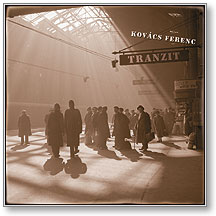 "The music material of this CD has been made for Gerzson Péter Kovács’s latest performance, that I accompany in live on the stage. Some of the pieces has been made long before, but were just performed this time.
"The music material of this CD has been made for Gerzson Péter Kovács’s latest performance, that I accompany in live on the stage. Some of the pieces has been made long before, but were just performed this time.
I composed the main motif when I was a college student in about 1978 (Symmetry). The time to play it has come. presently. I have written the repetitive piece for the Group No/180 (Window), but before having a rehearse of it I was kicked out of the group becouse of some problems on arranging dates with the Budapest Ragtime Band. Neither they played my piece written to them, titled „Crazy rag” , which can only be heard during the performance, since it is just a musical gag. My piece titled „Impudent” has been written for my Magony String Orchestra, but I played it on the CD alone, saving them the shains of working in the studio.
The opus titled „The Gate” was made in the spring of 2003, when we decided to form a jazz band with my pianist friend Zoltán Kovács. (The time came for it also this time.) Anyway it is the main composition. We preserved the first version because it is the most authentic one. Misi streches the notes in a perfect way, the excitement we all experienced is the original one. Later he performed great things on his instrument but that was too much and was about other things. I told him then that: „I think the first one is the best”, and he answered: „Of course, since I played that was necessary there”. He „gate” motif is a strange eqipoise of the E and F notes which generate the tension. The B flat and B tones give another dimension of this. The resolution on this axis is given by the D flat tone and its subsidiary tone, the A flat. Later I found this D flat tone on a trumpet I have taken from Tibet. No other overtones can be sounded on this strange horn. The time also came for this tone, after 5 years. Naturally it can also be heard in the performance. Of course we played the free musical parts as if we all had a 20-25 year experience with György Szabados. Attila Égerházi’s short piece also exactly fits were with its scale and meditative type.
When there are two accords as an accompaniment, then I constructed them in a way that they haave both functions at the same time. First there is one at the bottom with the left hand, and the other at the top with the right hand, and then conversely. It remains exciting this way. Such is TRANZIT itself. It is like a waiting hall, and people come from several places and times into it, and they start into very many directions. The strange meeting takes place anyway. The same thing happens to the orchestras as well. Someone is just coming, another just going. Everyone brings and takes something.
It can be felt from Zoltán Kovács’s solo that he is not only an excellent pianist, but also a brilliant composer! It is also good that they have got so used to each other with Szilu in the Djabe band. Of course it is easy to get used to Matyi, since he is invited everywhere to play the bass. Once I told him: „Matyi, listen to me, I’d like to talk to you”, and then he said: „Sorry, but I undertake no more bands”. And then he still dropped into the waiting hall.
Unfortunately Uncle Sipi could not come so I had to play the percussion parts. It is true that I made the big wood African kind xylophones myself, but I did not haave the impudence to take the sticks in my hand, so I was working with my hands and fingers. They turned out to be good, too. This, and the rhythm of the bass guitar provides the’ earth throbbing’ and ’earth heart’ of ’The gate’. So there are heavenly tones, earth throbbing and a state between the two in it. This is also TRANZIT." Ferenc Kovács
Kovács Ferenc - trumpet, violin, horn, piano, percussion
Dresch Mihály - sax
Kovács Zoltán - piano, keyboards
Szandai Mátyás - double bass
Banai Szilárd - drums
Égerházi Attila - guitar
Budai Sándor - violin
Barabás Tamás - bass
Madarász Péter - bass trumpet
Sipos András - derbouka, cajun
| 1. | Szimmetria | | 2. | Séta | | 3. | Mese I. | | 4. | Bázis | | 5. | Ablak | | 6. | Pariser | | 7. | Ménes | | 8. | Mese II. | | 9. | Hetyke | | 10. | Kapu | | 11. | Kozong |
|
|
Comments
(0 messages) |
|
GR 056 |
CD |
2005 |
0.00
€ |
 |
|
|
|
|
|
|
|
|
|
|
| |
|
Magony Vonósok (2CD)
|
world music |
|
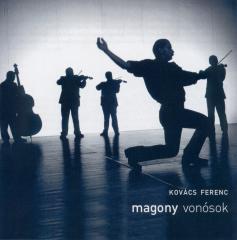 The Magony orchestra was formed in 2001, to perform in live Ferenc Kovács’s same titled solo album. Our repertory has been continuously enlarged with our own compositions and special elaborations of well-known Hungarian folk songs. The leader and composer of the orchestra is Ferenc Kovács. Their musical style can be determined by the expression "contemporary rustic music".
The Magony orchestra was formed in 2001, to perform in live Ferenc Kovács’s same titled solo album. Our repertory has been continuously enlarged with our own compositions and special elaborations of well-known Hungarian folk songs. The leader and composer of the orchestra is Ferenc Kovács. Their musical style can be determined by the expression "contemporary rustic music".
Ferenc Kovács’s career has been extremely coloured. After studying classical, modern, jazz and folk music he actively performs in many kind of orchestras (Djabe, Dresch Quartet, Kálmán Balogh and the Gipsy Cymbalom Band, etc.) nowadays as well. He looked for highly qualified fellows following different trends to the "magony style"‘ fermented in him. Sándor Budai was brought up in the Rajkó Orchestra, he is an open-minded musician who has dazzled many people all over the world with the well-known Hungarian gipsy music. Kálmán Oláh has taken his degree recently, he was a key figure of the Hungarian Virtuosi Chamber Music Orchestra. His knowledge is an evidence for the traditionally outstanding Hungarian instruction in music. Beáta Salamon is one of the best contemporary folk violinists, traditionalists (Méta, State Folk Ensemble). Csaba Novák has also been brought up in the Rajkó Orchestra, and he accompanies today’s greatest leaders of gipsy bands. Unfor-tunately, there is less and less demand for this kind of gipsy music which is unique in the world. Ferenc Németh after getting a degree at the medical faculty of the university, became a folk dancer, then an art director, then a folk musician. He is invited to many places because his singing is abundant in emotion, free from being mannered, and fostering traditions. The aim of ‚Magony‘ is to express our ancient Hungarian emotions in a Hungarian way by melting the classical, the gipsy and our folk traditions. The introducing concert of the orchestra was on the 22nd of September, 2001 in the Mu Theatre, as the opening of the older Ferenc Kovács’s exhibition: Magony sculpture portraits.
Kovács Ferenc - violin, flugelhorn, vocal
Salamon Bea - violin
Budai Sándor - violin, viola
Oláh Kálmán - violin
Novák Csaba - doublebass
Németh Ferenc - vocal
Mester László (Pintyő) - viola
Égerházi Attila - guitar
Barabás Tamás - bass
Kovács Zoltán - keyboards
Sipos András - percussion, vocal
Banai Szilárd - drums
| CD1 |
| 1. | Intro | | 2. | Boldog galamb | | 3. | Parasztbarokk | | 4. | A szarvas üldözése | | 5. | Szarvasok az erdei fényben | | 6. | Játszó | | 7. | Pásztoros | | 8. | Miskadal | | 9. | Jaj, de széles |
| CD2 |
| 1. | Bevezetés | | 2. | Sziklarajzok | | 3. | Repülés | | 4. | Legényes | | 5. | Groteszk | | 6. | Elindultam szép hazámból | | 7. | Le az úton, szép csendesen lefelé | | 8. | Esti dal |
|
|
Comments
(0 messages) |
|
GR 043 |
CD |
2003 |
0.00
€ |
 |
|
|
|
|
|
|
|
|
|
|
| |
|
Magony
|
world music |
|
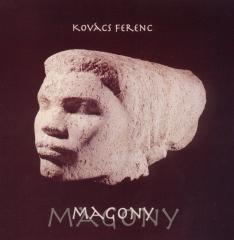 The first solo album by the soloist of Djabe and Dresh Quartet.
The first solo album by the soloist of Djabe and Dresh Quartet.
"One needs to be rapt in listening to the music of Kovács Ferenc, and this is good. One should listen to it several times. The best thing about Kovács - who, amongst others, gained experience for life from today's greatest cimbalom (dulcimer) artist Balogh Kálmán - is his respect for traditions, with which he treats his forefathers' heritage. I have not heard such unswerving devotion in today's music to Bartók Béla's approach to folk music for a long time. We are talking here about violin music inspired by Hungarian folk music, which is flanked here and there by the accompaniment of percussion instruments and, more than once, by the percussive application of the violin (the clip clop of deers' hooves). The folk song, however, has become only an indirect source by now. The way Kovács handles his instrument has evolved accordingly: his rustic and folksy vitality and harshness, his manner of bowing are often tinged with moving, pedantically intonated serenades; his rhythms are also precisely measured, which is less cahracteristic of folk musicians. Kovács played the different parts, which twine together here and there like creepers, by applying the multi-track recording technique." Gramofon
Kovács Ferenc - violins, vocal
Németh Ferenc - vocal
| 1. | Boldog galamb | | 2. | Parasztbarokk | | 3. | A szarvas üldözése | | 4. | Szarvasok az erdei fényben | | 5. | Játszó | | 6. | Pásztoros | | 7. | Miskadal |
|
|
Comments
(0 messages) |
|
GR 024 |
CD |
2001 |
0.00
€ |
 |
|
|
|
|
|
|
|
|
